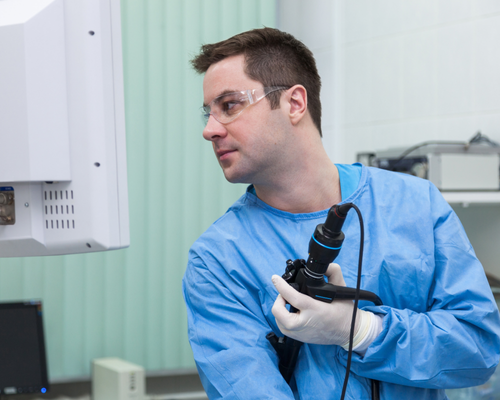7 in 10 cases of bowel cancer missed during a colonoscopy may have been avoidable
Friday 24 October 2025
In new research, funded by Bowel Cancer UK, Professor Eva Morris investigated why some bowel cancers go undetected during a colonoscopy.
Her team explored ways to help reduce the number of undetected cancers in the future. The results have been published in the scientific journal Endoscopy.
What are undetected bowel cancers?
Colonoscopy — examining the bowel using a camera on a thin tube — is the main test to diagnose bowel cancer, by allowing clinicians to see if a tumour is growing in the bowel. It can also help to prevent bowel cancer by spotting pre-cancerous growths (polyps) which can be removed during the procedure.
Bowel cancer is more easily treatable and curable when it’s diagnosed at the earliest stages. However, sometimes a tumour or polyp isn’t found during a colonoscopy and so bowel cancer is diagnosed later. This could mean the disease is detected at a more advanced stage.
When bowel cancer is diagnosed up to three years after a “clear” colonoscopy, it’s called a post-colonoscopy bowel cancer, or undetected bowel cancer. There are a high number of undetected bowel cancers in England, and the rates can vary greatly between different hospitals.
What was this project doing?
Professor Eva Morris and her team at the University of Oxford received funding thanks to our incredible supporters to investigate why bowel cancers can go undetected during colonoscopy. They also explored ways to reduce the number of these cases.
The researchers looked at data from hospitals in England to identify cases of undetected bowel cancers. They created a new auditing tool linking these data together so that each time a new case was diagnosed, the hospital where the person had their original colonoscopy was made aware. They asked hospitals to review these cases in detail to understand what happened in the colonoscopy and why the cancer was missed.
The team analysed all the cases across all hospitals to look for patterns and find the most common reasons for bowel cancers not being found. They looked at 1,724 cases in 122 different hospitals. Most of the procedures were carried out because the patient had symptoms, or as part of regular checks on people’s bowels.
What did they find?
Some of the cancer cases were due to new growths, which means that nothing was missed in the original colonoscopy.
However, nearly 7 in 10 cases may have been avoidable. It is thought that many are likely to have been caused by issues during the colonoscopy, such as growths being missed or not properly removed.
In other cases, clinical teams knew an original procedure hadn’t been good enough — for example, due to insufficient bowel preparation. Despite this, a repeat colonoscopy wasn’t always arranged, or patients chose not to have one. There were also issues with scheduling delays and a lack of decision making.
Patterns in the results can now be used to find areas to improve, such as extra training in certain techniques, or better photo documentation. They could also suggest if the time between colonoscopies (surveillance intervals) is too long for people with conditions that increase their risk of bowel cancer.
Using these findings to improve colonoscopy services across England could mean more than 800 bowel cancer cases each year are diagnosed earlier, or even prevented by removing pre-cancerous polyps. As well as saving lives, this could save the NHS money.
You can read the full research paper here.
What happens next?
The findings have been shared with the colonoscopy field and well received. Many NHS colonoscopy units have asked for access to the full results to help improve their services, and hopefully reduce the numbers of these cases in the future.
The auditing tool that the research team developed would allow hospitals to continue to collect new data on undetected bowel cancers and monitor any specific issues in their clinic. It is vital that this auditing tool is embedded into NHS practice. We urge the Department of Health and Social Care and the NHS to ensure IT infrastructure can support initiatives like this tool, which will improve early diagnosis of bowel cancer and drive service improvement.
The success of this project has also supported a grant from the National Institute for Health Research to adapt the tool for oesophageal and gastric cancers missed during endoscopy (another type of camera test).
- Read more about colonoscopies and endoscopies
- Find out more about Professor Morris' research
- Learn more about our research

